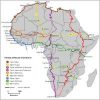Guinea and the Democratic Republic of Congo have become shareholders of Africa50, an initiative of African Development Bank Group (AfDB) that aims to improve infrastructure in Africa by developing bankable projects and catalyzing investments.
The Africa50 fund has already attracted over US $800 million from 23 African shareholder countries, the Central Bank of West African States (BCEAO), the Bank Al-Maghrib (BAM), and the AfDB. “With Africa50 we have an important partner, with all the enthusiasm and vigour that is necessary for Africa’s economic transformation,” Akinwumi Adesina, the President of the African Development Bank (AfDB), told shareholders in Senegal.
Adesina spoke at the Shareholder Meeting of the Africa50 Infrastructure Fund (Africa50) in Dakar, Senegal, on Tuesday, September 12, 2017, where he solicited greater support for the Fund.
“It deserves to succeed”, he continued, “and for this it has the support of the African Development Bank, [and] its shareholder countries.”
The AfDB President said that Africa50 must help to set up a series of ‘bankable’ projects in line with the High 5s – focusing on the energy sector – and promote public-private partnerships.
Average yearly infrastructure financing needs in Africa are estimated to be about $130 billion through 2025, of which only about 60% ($80 billion) was being funded in 2015, leaving a large financing gap. Similarly, project development spending needs are estimated at $6.5 billion a year, well above the $4.0 billion funded in 2015. Africa50 is designed to narrow these gaps.
Hosted by the President of the Republic of Senegal, Macky Sall, the meeting was attended by representatives of African States, Africa50 shareholders, Senegalese civil servants, members of the diplomatic corps, and financial partners.
In his opening remarks, President Sall expressed his firm commitment to Africa50, which he said aims to be a “catalyst for private sector investment, both inside and outside Africa, in order to develop infrastructure on the continent and plug the deficit in public resources”.
He highlighted the need for African governments to improve the business climate by creating an environment that is favourable to private investment in infrastructure, including the regulatory environment, so that public-private partnerships can be developed.
“Africa is open for business”, Sall declared, pointing out that the continent has defined its priorities with initiatives such as the Programme for Infrastructure Development in Africa (PIDA).
The CEO of Africa50, Alain Ebobissé, confirmed that the fund fulfills its development and investment mandate, supporting infrastructure projects in shareholder countries and operating via a process that combines the selection of projects with a clear development impact and a commercial management approach that attracts private investors.
“With your support, Africa50 will act as a bridge between the African states that created it and public companies operating in the infrastructure sector, as well as private infrastructure backers, project promotors, other financial institutions capable of deploying resources in the long term, and institutional investors, with the primary goal of speeding up the implementation of infrastructure projects in Africa,” he said.
He then spoke about the key factors for the success of Africa50: support from shareholder countries and the AfDB, the quality of the management team, and “the quality of projects, since it is important that they have a strong development impact as well as a clear commercial character in order to attract private investors.”
The third Africa50 Shareholder Meeting ended with the signing of an agreement between the CEO of Africa50 and Mouhamadou Makhtar Cissé, Managing Director of SENELEC, the Senegalese public electricity company, to continue developing the planned solar plant at Malicounda in the Thiès region of Senegal.

